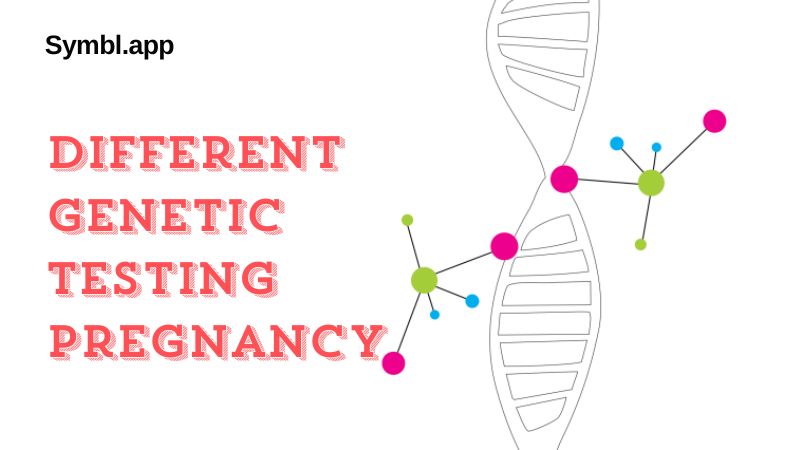Genetic testing throughout pregnancy has become an indispensable aspect of prenatal care, offering invaluable insights into fetal health and development. From early screening for chromosomal abnormalities to comprehensive diagnostic tests, there exists a spectrum of genetic testing modalities tailored to address diverse parental concerns. This article from Symbl.app endeavors to elucidate the significance of different genetic testing pregnancy methods, highlighting their respective benefits and considerations.
Different Genetic Testing Pregnancy Methods
Carrier Screening:
At the genesis of family planning, carrier screening emerges as a pivotal step in preemptive genetic assessment. This proactive measure aims to identify potential carriers of specific gene mutations linked to inheritable disorders, such as cystic fibrosis or sickle cell anemia. By scrutinizing the genetic makeup of prospective parents, carrier screening facilitates informed decision-making regarding conception and family planning. Its utility lies in elucidating the genetic risks inherent in the parental lineage, thereby empowering couples with crucial information to navigate their reproductive journey with foresight and awareness.

Non-Invasive Prenatal Testing (NIPT):
Non-Invasive Prenatal Testing (NIPT) epitomizes a paradigm shift in prenatal diagnostics, heralding an era of non-invasive, high-precision screening for chromosomal aberrations and genetic anomalies. Leveraging advanced sequencing techniques, NIPT analyzes minute traces of fetal DNA circulating within the maternal bloodstream, obviating the need for invasive procedures. Typically administered during the gestational window spanning the 10th to 13th weeks, NIPT furnishes expectant parents with early insights into the fetus’s genetic profile, affording ample time for informed decision-making and appropriate medical interventions. Its non-invasive nature coupled with superior accuracy renders NIPT a cornerstone in contemporary prenatal care, engendering reassurance and facilitating proactive management of potential genetic concerns.
Chorionic Villus Sampling (CVS):
For expectant parents seeking comprehensive genetic scrutiny during the embryonic phase, Chorionic Villus Sampling (CVS) stands as a formidable diagnostic tool of unparalleled precision. By procuring minute tissue samples from the placental chorionic villi, CVS enables meticulous analysis of fetal chromosomes, thereby unearthing subtle aberrations indicative of chromosomal anomalies and hereditary conditions. Typically conducted between the 10th and 13th weeks of gestation, CVS furnishes expectant parents with definitive diagnostic insights, empowering them to make informed decisions regarding their pregnancy trajectory. Despite its diagnostic prowess, the procedure necessitates careful consideration due to its associated risk of miscarriage, underscoring the imperative of balanced risk assessment and judicious utilization in clinical practice.

Amniocentesis:
Amniocentesis emerges as a stalwart ally in the pursuit of comprehensive prenatal diagnostics, offering unparalleled insights into fetal health and genetic integrity. This invasive procedure entails the extraction of amniotic fluid, thereby facilitating meticulous analysis of fetal cells and DNA. Typically performed during the mid-trimester, between the 15th and 20th weeks of gestation, amniocentesis provides definitive diagnostic clarity regarding chromosomal aberrations and genetic anomalies, thereby enabling expectant parents to navigate complex medical decisions with clarity and confidence. However, its invasive nature necessitates careful deliberation, as the procedure entails a marginal risk of miscarriage, underscoring the importance of informed consent and judicious utilization in clinical practice.
Expanded Carrier Screening:
In the realm of genetic testing during pregnancy, Expanded Carrier Screening emerges as a beacon of comprehensive risk assessment, transcending the confines of traditional screening paradigms. Unlike conventional carrier screening, which targets specific genetic disorders, expanded screening casts a wide net, encompassing an extensive array of genetic mutations associated with diverse hereditary conditions. By scrutinizing the genetic landscape with unparalleled granularity, expanded screening elucidates latent genetic risks that may elude conventional screening modalities, thereby empowering expectant parents with foresight and preparedness. Whether undertaken preconception or during gestation, expanded carrier screening epitomizes personalized medicine, tailored to unravel the intricacies of individual genetic predispositions and familial legacies.
Ultrasound:
While not a genetic test per se, ultrasound assumes paramount importance in the prenatal diagnostic armamentarium, offering real-time visualization of fetal anatomy and physiology. Through meticulous sonographic evaluation, healthcare providers can discern subtle anatomical nuances and identify markers indicative of underlying genetic conditions. From assessing fetal growth and organ development to detecting structural anomalies, ultrasound serves as an indispensable adjunct to genetic testing, facilitating holistic prenatal care and informed decision-making. By amalgamating genetic insights with sonographic findings, healthcare practitioners can proactively manage pregnancy complexities, thereby optimizing maternal-fetal outcomes and engendering reassurance amidst uncertainty.

Conclusion:
In navigating the intricate landscape of prenatal care, understanding the nuances of different genetic testing pregnancy methods is imperative for expectant parents and healthcare providers alike. From the initial stages of carrier screening to the advanced diagnostics afforded by CVS and amniocentesis, each modality offers unique insights into fetal health and genetic integrity. By embracing these technologies judiciously and integrating them into the fabric of comprehensive prenatal care, we can empower expectant parents with knowledge, foster informed decision-making, and optimize outcomes for both mother and child. As we continue to unravel the complexities of human genetics, genetic testing during pregnancy stands poised to redefine the paradigm of prenatal care, ushering in an era of precision medicine and personalized health management.
